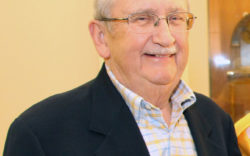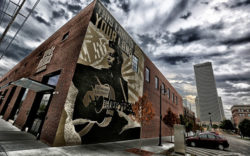Alex Cooley, Atlanta’s first pop music impresario, died last month at 75. Cooley had said he didn’t want a funeral, so his longtime business partner, Peter Conlon, organized a celebration of his life Saturday, Jan. 9 at The Tabernacle in downtown Atlanta. Tickets to the event disappeared on the first day they were offered.
There was a lot to celebrate. Cooley produced and promoted the first Atlanta International Pop Festival in the summer of 1969, when he brought Led Zeppelin, Janis Joplin and Joe Cocker to a motor speedway venue in Hampton. Some 100,000 fans attended, which encouraged Cooley to produce a second festival the next year in Byron, near Macon. This time an estimated 500,000 turned up to hear the Allman Brothers and Jimi Hendrix, among others.
Over the next 30-plus years, the tag “Alex Cooley Presents” became a respected brand at major Atlanta venues such as the Omni, Municipal Auditorium, Civic Center, Fox Theatre and the Chastain Park amphitheater. Atlanta became a major stop on every national tour, and Cooley was the prime presenter, at one point producing an astonishing 300 shows a year.
Cooley also booked top musical acts such as the Sex Pistols, Bruce Springsteen and Jimmy Buffet into venues he ran—clubs like the Electric Ballroom, the Great Southeast Music Hall, Capri Ballroom, Roxy Theatre and the Cotton Club. He also continued to organize festivals in far-flung places like Puerto Rico and Dallas, TX. And he launched the three-day Music Midtown festival in Piedmont Park, which annually drew crowds of more than 100,000.
Within a few years, Cooley, with Conlon as his business partner, built Atlanta’s reputation as a top-tier music market. Cooley thought music would boost his hometown’s image as hip and progressive.
Although Cooley relished all genres, his Tabernacle celebration featured mostly rock and roll—including Sugarland, Blackberry Smoke, Drivin’ N Cryin’ and the Indigo Girls. Drivin’ N Cryin’s Kevn Kinney filled the hall with booming vocals, befitting Cooley’s huge presence. The high point was clearly the Bob Dylan chestnut “I Shall Be Released” (which was nearly sullied by an over-enthusiastic guitarist—who looked like Alice Cooper without makeup—shouting at its conclusion: “Alex fucking Cooley!”).
A handful of speakers offered accolades in broad strokes, which didn’t quite capture Cooley’s complexity. Conlon shared a few anecdotes about working with Cooley and called him “a pioneer, a genius and a renegade.” He reminded attendees that Cooley had organized an early benefit for Jimmy Carter that kept his presidential campaign alive at a crucial moment. He also cited Cooley’s key role in saving the Fox Theatre.
An Indigo Girl called him an “inspiration.” Cooley’s niece, Edie Sayeg, said he was a good storyteller at family gatherings. Sugarland frontman Kristian Bush said Cooley had helped him “get to where I am right now.”
Andrew Hingley, whom Cooley entrusted in recent years with booking at Eddie’s Attic in Decatur, said his boss had made a difference in people’s lives and had a massive impact on music in Atlanta. He explained Cooley’s peccadillo of always carrying large amounts of cash: “It made him feel like a promoter” even though he officially retired in 2004. Hingley said Cooley was both mentor and father figure to him, probably because he was still young at heart.
A video presentation, produced by Dale Falk, included snippets from a recent, low-key Cooley interview and backstage snapshots of performers, crew members and fans. Curiously, a grizzled Willie Nelson, who said he appreciated the world tour Cooley crafted for him, had the final word of the evening: “He will be missed.”
Personally, I had gotten a glimpse at other aspects of Cooley’s life over the past two years. Health issues were paramount. He had lost an incredible amount of weight—from about 400 pounds to 250—so as to not overtax his heart.
He worried about people trying to rip him off, even though he had become a millionaire from the sale of his company to the corporate promoter Live Nation. I sensed he also had lingering guilt about “selling out.”
While Cooley had long been a public figure, he appeared modest and reluctant to be in the spotlight. He was also thinking about how he would be remembered and contacted me to discuss helping him tell his own story. Throughout his career, he was obviously a risk-taker, yet he was now indecisive and uncertain.
Over lunch recently, he said he didn’t think anyone would be interested in his autobiography and he certainly wasn’t interested in a kiss-and-tell memoir that would diss those with whom he had worked for years. He admitted being stuck on what he wanted. I asked if he just wanted to be part of a history of music in Georgia. “No,” he responded, “I have an ego, too.”
I’ve saved a message Cooley left on my answering machine. In his deep, gravelly voice, he said, “John, I really want to do it.” He paused. “I think.” His dilemma ended when he died Dec. 1 at his retreat in Ponte Vedra, FL. It’s sad to me that he never got to tell his own story.
Like what you just read? Support Flagpole by making a donation today. Every dollar you give helps fund our ongoing mission to provide Athens with quality, independent journalism.










